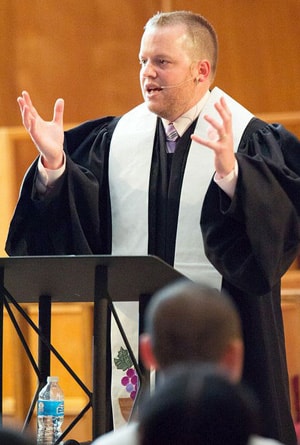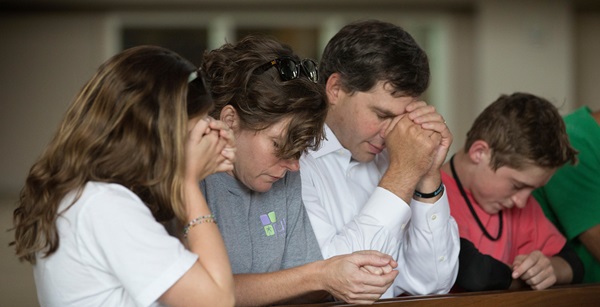Many youth in the U.S. who regularly attend worship, go on summer mission trips, sing in the youth choir, and actively participate in the youth ministry of their United Methodist congregations, drop out of church after high school graduation.

The Rev. Daniel Dennison, Wesley Campus Minister at the University of Oklahoma, has noticed the difference a maturing faith makes in the lives of high school graduates.
"The students who come to us that have been discipled and taught how to have a growing relationship with Christ while on their own, generally thrive in college," he said. "They [appear to] do better in school; they are more well-adjusted and become stronger leaders in our ministry."
Many others "fall away from the church altogether," he added. "Some continue to stay involved, but it's nominally and surface level."
This is distressing news to pastors, youth leaders, and parents who long to keep young people engaged in their faith.
Parents' faith is key
The National Study on Youth and Religion found a factor that is "nearly deterministic" in turning this around. Eight out of ten (82%) young adults ages 24-29 who were still participating in their faith after being active in high school, had one thing in common.
The secret? Their parents.
Youth leaders agree. "Parents are the critical discipler, period," said Seth Martin, former Lead Student Pastor and now Lead Director of The Road at Faithbridge United Methodist Church in Spring, Texas. "Student ministries aren't (or shouldn't be, rather) the primary spiritual mentors of students, but should instead subsidize the discipleship already taking place in the home."
Many youth ministers are encouraging parents in their critical role in the spiritual development of their teenage children.

"Every chance I get to talk to parents," said Stephen Ingram, former Director of Student Ministries at Canterbury United Methodist Church in Birmingham, Alabama, "I remind them of the stats." Ingram now serves as Director of Whole Life Spirituality at Canterbury.
But not all parents feel prepared to spiritually mentor their kids. That's why, Ingram said, "the best youth ministries work in partnership with parents."
United Methodist Communications spoke with several youth ministry leaders about what they are sharing with parents.
Deeper parent-youth communication
The study found that youth who remained active regularly had faith conversations with their parents.
Often the extent of parent-youth spiritual discussions happen on the ride home from church. "How was church (or youth group, Sunday school, small group, etc.)?" the parent asks. "Good," is the monosyllabic response.
When Casey Walker served as Minister to Youth and their Families at Searcy (Arkansas) First United Methodist Church, saw something similar following a youth trip. "I noticed not a lot of conversations were happening at home," she said. "The youth didn't know how to put words together to express what they had experienced, and parents were not sure how to ask good questions."
Walker invited parents to a gathering where she shared some tips for starting spiritual conversations with their youth.
Ingram encourages parents to avoid questions that can be answered with one word. He teaches parents to facilitate discussions. Parents don't need to be experts with all the answers. They just need to be willing to journey and question along with their children.
Some great places to start are talking about Sunday's sermon; including faith when discussing something in the news; or asking about the youth group lesson.
Martin emails parents in his youth ministry "Followups," which are overviews of the youth lesson that contain "Scripture and a few basic questions to enable parents' conversations with their students to be a bit more targeted."
Without a tool like "Followups," parents can ask their children what they liked best about the lesson, or what challenged them.

Parental support
In addition to education opportunities, Walker's youth ministry has formed several discipleship groups for parents of youth. They "intentionally put parents of 6th graders in groups with parents of seniors to encourage one another."
Faithbridge also holds educational workshops that "pull parents together … and connect them with sharp people who can inspire, equip, and challenge parents to engage on a given topic," Martin said. These two-hour dinner gatherings also connect parents who might not otherwise meet.
Parents are strengthened by the support of others who have teenage children.
Walker wants parents to know, "You're not alone. Parenting is tough and there are others to journey with you."

A spiritual journey for the family
Parents sharing the importance of their faith with their teenage children was named by the study as an important factor.
Ingram, who is also the Director of Whole Family Spirituality at Canterbury United Methodist Church, helps parents by holding an annual Whole Family Spirituality Retreat. The retreat seeks to "help families think about and practice being an intentionally spiritual unit," Ingram said.
He encourages families to think theologically together. Some might discuss a devotion over dinner while others might talk through the highs and lows of their day.
The goal of this time together, Ingram says, "is not so much how to deal with X, but what you think about X, and what our faith teaches us about it."
Start small
Ingram said it is wise for parents to begin by taking "baby steps." Walker agrees and encourages parents to persevere.
When she first wanted to start praying a blessing over her daughter every night, Walker was hesitant. "She's going to think I'm crazy," she thought.
After a few nights of discomfort, things changed. Her daughter wanted to know more about the blessing. "Show me where [in the Bible] it came from," she asked.
"Now, when I'm out of town," Walker said, "she will call and ask me to give her the blessing over the phone before she goes to bed."
A matter of influence
While involvement in youth ministry is a valuable experience, "Nobody has the influence, exposure time, authority (or even biblical command/expectation) to raise up students like the parent does," said Martin.
"After youth group," Walker said, "parents are still there, for the rest of their lives."
*Joe Iovino works for UMC.org at United Methodist Communications. Contact him at [email protected] or 615-312-3733.
This feature was originally published May 27, 2015.





